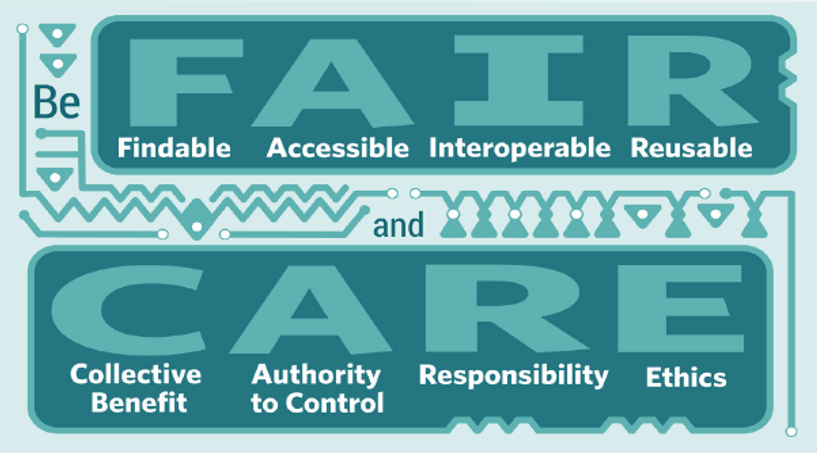18 Open Data and Ethics Summary
18.1 Data Publishing and Documentation, Part Two
18.1.1 Learning Objectives
In this lesson, we will:
- Summarize data ethics in the context of open science
- Review and edit your statement on ethical considerations of your research
- Peer review these statements
18.1.2 Open Data and Ethics
The foundation of open-science is based on making all aspects of scientific research accessible across broad communities, whether professional, academic or public. This includes
- publications
- data
- software
- sample
- code
At its core, open science is built on principles of transparency and capacity for collective knowledge. The practice of open science is being increasingly adopted by researchers across disciplines, and organizations and working groups such as FORCE11 promote and support this through development of principles and guidelines that inform activities.
While open-science affords researchers the opportunity to extend the reach of their work (Puebla & Lowenberg, 2021) and increases transparency and public trust, such transparency creates challenges for those researchers working with sensitive data and Indigenous knowledge. Open science principles are informed largely by western knowledge concepts and do not consider Indigenous data sovereignty and Indigenous Knowledge (Research Data Alliance International Indigenous Data Sovereignty Interest Group, 2019).

Transparency in data ethics is a vital part of open science. Regardless of discipline, various ethical concerns are always present, including:
- professional ethics such as plagiarism, false authorship, or falsification of data
- ethics regarding the handling of animals
- concerns relevant to human subjects research
- explicit consent versus implicit consent
- land permitting and land use
- communications and interactions with nearby communities
- data sharing and use
- data sovereignty and governance
Sharing ethical practices openly, similar in the way that data is shared, enables deeper discussion about data management practices, data reuse, sensitivity, sovereignty and other considerations. Further, such transparency promotes awareness and adoption of ethical practices.
As the primary data repository for the National Science Foundation Office of Polar Programs Arctic Sciences section, the Arctic Data Center accepts data from all disciplines including social science and other research that may be subject to IRB restrictions, involve Indigenous knowledge, or have been carried out on Indigenous lands. Researchers submitting data now have the opportunity to articulate these and other considerations as part of the metadata record.
18.2 Activity and Discussion
For the last session on data ethics and open science, we will review the ethical considerations that we wrote on Tuesday, review it ourselves, and then peer review and discuss other statements.
- In your email you should have a link to the shared Google drive, as well as information on how your ethical statement has been coded, and the statements that you will peer review.
- Open your own statement and spend the first 5 minutes reviewing your statement. Use “suggestion mode” so that all changes are tracked. Questions to consider:
- What ethical considerations are the most relevant in your research, and why?
- Does your statement account for land permitting? Why or why not?
- Does your statement cover how the data will be shared or not? Why or why not?
- Do you feel that statement has changed considerably, or remains relatively the same?
- How can principles such as the CARE principles, be adopted into your research?
- For the first review round, review the statement listed in your email. You have 5 minutes for the first round. Using the suggestion mode and comments, consider the following:
- Were there many changes added from the first review?
- Given that you may not know this person’s research, does this statement appear to comprehensively cover any relevant ethical considerations?
- Does anything from this statement stand out?
- For the second review round, review the statement listed in your email. You have 5 minutes for this round as well. Using the suggestion mode and comments, consider the following:
- Were there many changes added from the first and second review?
- Given that you may not know this person’s research, does this statement appear to comprehensively cover any relevant ethical considerations?
- Does anything from this statement stand out?
- In breakout groups, discuss the following:
- What are some main takeaways from reviewing these statements?
- What are some things that you thought were particularly effective?
- Did reading the statements from others inform your own statement?
- Did the statements you read undergo any similar changes or receive similar comments?
- In general, do you think having these statements publicly available on the Arctic Data Center will be helpful to other researchers?
- Is there anything about this ethical considerations statement process that could be improved or changed?